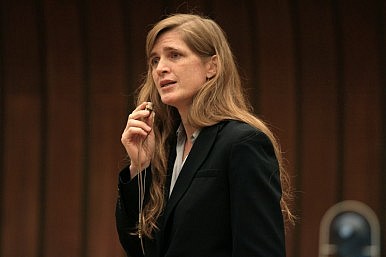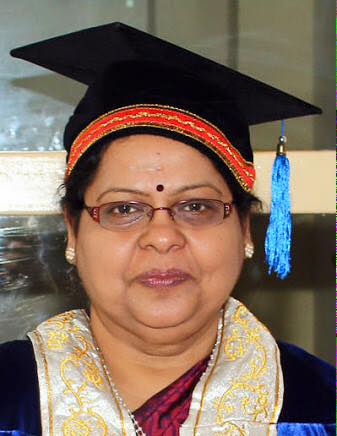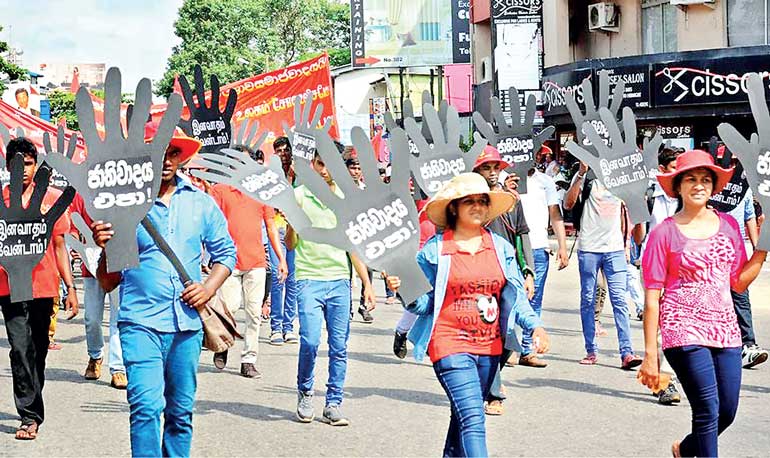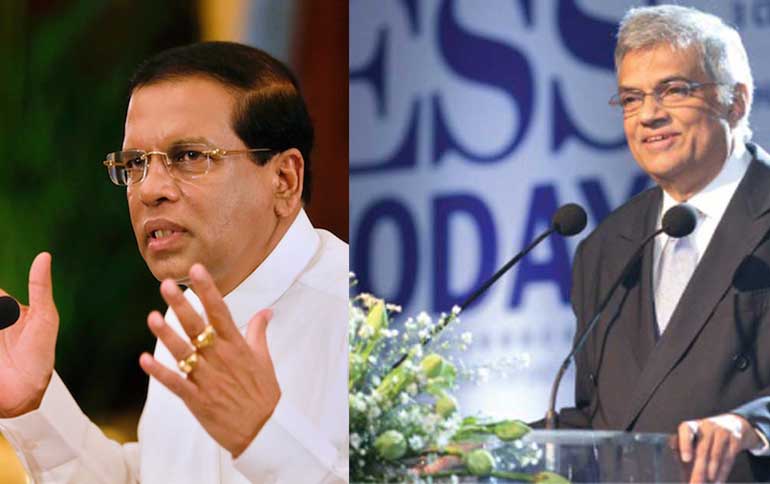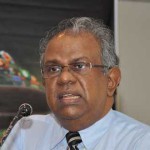A Brief Colonial History Of Ceylon(SriLanka)
Sri Lanka: One Island Two Nations
A Brief Colonial History Of Ceylon(SriLanka)
Sri Lanka: One Island Two Nations
(Full Story)
Search This Blog
Back to 500BC.
==========================
Thiranjala Weerasinghe sj.- One Island Two Nations
?????????????????????????????????????????????????Saturday, April 30, 2016
Samantha Power Misses the Mark on Sri Lanka (Again)
The Obama administration’s messaging on Sri Lanka misses the mark yet again.
Like the author of this piece, some readers may be wondering (quite
reasonably) why Power was attending a meeting focused on economic
issues. According to a media advisory note from the Office of the United
States Trade Representative, Power’s participation would “highlight how
the U.S.-Sri Lanka Joint Action Plan [the agreement inked Thursday]
represents continued progress for human rights, as well as democracy and
accountability, on the part of the newly elected Sri Lankan
government.”
It’s no secret that the United States has been keen on resetting the
relationship with Sri Lanka since Maithripala Sirisena won the
presidency in January 2015. Nevertheless, the Obama administration’s
rhetoric continues to be wildly out of step with reality. Let’s take a
closer look at Power’s statement.
Here’s a one paragraph:
Of course, the fact that we [the U.S. and Sri Lanka] are all here in an incredibly positive atmosphere reflects just how much has changed in Sri Lanka since January 2015. That was the month where Sri Lankans cast their votes for a new era: one in which their leadership committed to seeking a durable peace, an accountable democracy, a new relationship with the outside world, and expanded opportunities for all.
Sri Lanka watchers will notice that instead of the United States clearly calling for accountability for wartime abuses (a
hugely controversial issue in post-war Sri Lanka), the language seems
to have shifted to “accountable democracy.” This is something to watch
going forward. Is Washington still genuinely pushing for wartime
accountability?
Power talks about the “extraordinary progress” that Sri Lanka has made
under Sirisena’s leadership. “Sri Lanka has, since January 2015, emerged
as a global champion of human rights and democratic accountability,”
she says.
Global champion of human rights and accountability? That’s quite an assertion.
Sri Lanka’s new government has ruled in a less authoritarian fashion
than the administration of Mahinda Rajapaksa, though it’s unclear how or
when Colombo became a “global champion” of human rights and
accountability. The truth is that we’re still waiting for the government
to move toward deeper reform.
Besides, the recent spate of arrests and abductions across the
Tamil-dominated Northern and Eastern Provinces should set alarm bells
ringing in Washington. That’s the type of anti-Tamil behavior that
became increasingly common during Rajapaksa’s divisive decade in power.
“The United States will seek to leverage our assistance this year to
further support broad-based economic growth,” Power says. Well, sure,
everyone can get behind economic growth. The problem is that it looks
like Obama’s team is no longer prioritizing the more important (and more
controversial) war-related issues that had been a longstanding concern
for the United States. In Power’s remarks, there’s only a fleeting
reference to “transitional justice.”
Washington is “very clear-eyed about the challenges ahead,” Power says.
Unfortunately, others – including the Sirisena administration – may have
already drawn a very different conclusion.
Jaffna steel houses not suitable for human occupancy

Findings
in a report by a team of local experts say 65,000 steel houses to be
constructed in Jaffna by India is a failed project. The report says
these houses are without any standard and are not good for human
occupancy.
A University of Moratuwa’s civil engineering faculty team headed by
Prof. Priyan Dias has prepared the report. Other members of the team are
Dr. Rangika Halwatura and architect Varuna de Silva.
The report says, the steel houses are around at least double the
cost of a block wall house and have poor or non-existent capacity
for extension or repair.
The steel houses suffer from inadequate foundations, insufficient roof
support, risk of steel corrosion despite the coatings provided and poor
ventilation.
Constructed by an Indian company with Indian aid, the entire cost is more than 200 million US dollars.
There have been views expressed to the effect that these houses are not
suitable for human occupancy. Northern chief minister C.V. Vigneswaran
was one of those who had expressed those views. However, rehabilitation
and resettlement minister D.M. Swaminathan has maintained they were up
to standards.
Jaffna University Sexual Harassment: AL Students Demand UGC Inquiry

By Ruba Ratnasingam –April 29, 2016
As has been reported in Colombo Telegraph Dr. S. Dharshanan, Head of the Department of Music and a close relative of Jaffna VC Vasanthi Arasaratnam,
was suspended from service without pay following numerous accusations
of sexual harassment by his students and staff colleagues at the
Ramanathan Academy of Fine Arts (RAFA). These accusations had been there
from 2011 but the Council inquiries had asked the accusers to cooperate
with their accuser. Action was forced only when numerous students
complained in writing and were ready to riot, and one student was on the
verge of committing suicide.
The four years of licence to do anything with the women under his
authority that the Council effectively gave Dr. Darshanan is now showing
its consequences. These consequences are undermining the academic
standards of the university. Darshanan is gone, albeit temporarily, but
the effects of his stewardship of the Department of Music refuse to go
away. His ghost is haunting the university.
University admissions are based on the z-score, a normalized system of
marks that allows a comparison of performance in subjects where it is
easy to score with that in subjects where it is difficult to score.
Unlike raw marks, the z-score yields a 1.0 for the medium of the raw
marks and forms a common basis for comparison. Those on the merit lists
for say engineering and medicine get a z-score of around 2, way off the
norm on the upper side. In subjects that no one wants to do, even a
z-score under 0.5 may merit admission. The RAFA is a place where the
score is well off the norm in subjects like music that few want to do.
As such the students too are from families where there is no culture of
protesting when there is injustice.
Generally the z-score system gives a good way to base admissions on.
However, there are some subjects where it is claimed that aptitude is
important and has to be measured as a part of the admission process.
Thus Architecture is a subject where academics measure aptitude to
depart from the strict use of the z-score and it is common and not
surprising to see the children of academics being assessed to have high
aptitude and getting admission. Although many recognize this as unfair,
it is difficult to change because academics run the university system
and want that system retained. However, keenly competitive subjects like
medicine and engineering also demand aptitude but it is never assessed
because favoritism there will result in a riot.
Tamil protestors beat back Sri Lankan military surveyors
|
Sri Lankan protest demands new probe of Tamil journalist's killing
Sri
Lankan journalists shout slogans holding a portrait of killed
journalist Dharmeratnam Sivaram during a protest in Colombo. AP
 Colombo: Hundreds
of journalists and media rights activists protested on Friday to demand
Sri Lanka's new government start a fresh investigation into the
abduction and killing of a prominent ethnic Tamil journalist 11 years
ago, during the country's civil war.
Colombo: Hundreds
of journalists and media rights activists protested on Friday to demand
Sri Lanka's new government start a fresh investigation into the
abduction and killing of a prominent ethnic Tamil journalist 11 years
ago, during the country's civil war.
Those demonstrating in front of Colombo's main railroad station said
Dharmeratnam Sivaram was targeted because of uncompromising coverage of
political and military matters.
Media rights activist Lasantha Ruhunage said even 11 years after, the
law enforcement authorities have failed to find the killers and
"therefore they should start a fresh investigation and bring the
culprits before law."
Sivaram was found dead on 29 April, 2005, in the capital, Colombo, after being abducted the previous evening.
The 30-year civil war ended in 2009 after government troops defeated the
Tamil Tiger rebels, who fought to create a separate state for minority
Tamils. Scores of journalists and media workers were killed during the
war, and several dozen journalists fled the country.
The government has promised to implement a compensation plan for 44
journalists and other media workers killed under the former government,
but Ruhunage said "more than compensation, the attacks on journalists,
media workers and media institutions should be properly investigated and
those responsible for the attacks should be punished, in order to
ensure justice to the media community."
The new government that came into power last year promised to ensure
media freedom and to investigate attacks on media under the previous
government of President Mahinda Rajapaksa, who lost last year's
presidential election. While Rajapaksa was in power, a prominent
opposition newspaper editor and scores of journalists were killed and
some others were assaulted while some private TV stations were attacked.
They march on May Day


If the climate prevailing now holds, it will not be their ally, tormenting the weary marchers with a sweltering day of extreme humidity. After all the sound and fury, the day will end like most their days, bone weary, hollow, signifying nothing.
They have been marching from pre-independence days, going back to early 1930s, when A.E. Gunasinghe led the labour movement. In 1935 came the left parties, giving more militancy to the parades in line with the ideology of class conflict. So backward was our economic/social development, this was nearly a century after the publication of the epoch making Communist Manifesto in 1848, a stirring call to arms by the then 30 year old Karl Marx.
“The proletarians have nothing to lose but their chains. They have a world to gain. Working men of all countries, unite!” was the clarion call.
Whole new world
With colonisation came a whole new world of ideas and ways of thinking. But things can be studied, copied or imitated and yet remain foreign, partially perceived and only imperfectly understood. It is good for all concerned to have competing businesses. But the idea of competition, if interpreted wrongly, could lead to the ruin of all.
In Sri Lanka, you open a kindergarten, the next day there will be another, and yet another, opening right next door. Inevitably the idea becomes meaningless, losing all credibility, the process leading to mutual destruction.
Even when it came to May Day rallies, before long, every political party began to stage their own. In some instances, particularly in the estate sector, large-scale employers also led the workers unions! The political clout that the unions gave them allowed them to acquire more economic power, enabling them to command still more political power. Now, this self-serving cycle would apply to most politicians addressing the rallies on May Day.
 Class struggles
Class struggles
Arguably, in some form or the other, we are all workers. No one just vegetates. Even to meditate, one must use human faculties. The politician, the judge, the doctor, the architect; they are all workers, presumably more intellectual than physical. But that is not what Marx meant. It is in relation to the means of production that the class is defined.
“The history of all hitherto existing society is the history of class struggles. Freeman and slave, patrician and plebian, lord and serf, guild – master and journeyman, in a word, oppressor and oppressed stood in constant opposition to one another, carried on an uninterrupted, now hidden, now open fight, a fight that each time ended, either in a revolutionary reconstitution of society at large, or in the common ruin of the contending classes.”
The bourgeois proved to be a much harder nut to crack than Marx anticipated. Combined with liberal democracy, the free enterprise system has given its citizens a standard of living and a sense of freedom far superior to anything enjoyed hitherto. Contrary to the anticipated mass impoverishment, the efficiencies of the system have opened up a prospect of plenty while making it possible to enjoy more leisure than was possible in any other epoch.
The average worker in the Developed world perhaps leads a life style far superior to a rich man in a poor country. In the everyday services like education, health, transport he could assume a standard, which will only be a rare exception in a poor country. His supermarkets will carry the best of foods. His bakery will produce the best of bread. He could travel freely. He may take for granted the sense of well-being and security that a rich and orderly society provides.
Quite justifiably, these countries could tell the putative socialist States like China and Vietnam that ‘imitation is the sincerest form of flattery”. Meanwhile, the more hard-line North Korea, while mouthing Marxist slogans, has degenerated into a derelict torture chamber run by the founders’ family.
Capitalism
In our little country, capitalism was late in coming. Both the Dutch and the British only promoted a non-industrial type of capitalism in the form of plantations. Even today our industrial base is small and relatively backward.
Whatever industry that has been established are by and large those using the lower range of technology, supported by a high in-put of labour. These are industries which are relatively easy to get in to; competition is high, margins low and extremely vulnerable to market fluctuations.
The advance working class Marx was writing about hardly exists here. In terms of productivity, whether it is the plantations, rice paddies or the factories we lag behind. To put it in another way, per person, our workers are definitely not among the most productive.
On the other side of the divide, the so-called capitalist in the country, owe their success to either a crime or unashamed cronyism. There is no businessman who can claim success without having had political patronage. With the political swings, his fortunes also rise and fall. Among the local entrepreneurs one sees little creativity or innovation, imitation and copying being the easy way to do business. By all accounts, corruption, bribery and commissions form the essence of our business methods.
The political establishment
We then go to the leaders, the political establishment. Since 1948, we have never achieved the sustained rate of economic growth that enabled newly-industrialised countries to break the shackles of poverty. Under their watch, there is no institution which has not been degraded, nor is there a service which can claim to be superior to what was say thirty years ago, leave alone international standards.
Reflective of a deep rooted feudalism, their governance style is more ceremonious than being effective and target oriented. The long drawn out religious ceremonies that precede any public function, when there is not a jot of spirituality in them, tells the story. It is with the form of governance they are preoccupied with; mode of address, method of approach; not the substance thereof. With no past performance to talk of, little to show for the present, it is in the art of drawing a rosy future they thrive at.
Salvation will come with the next constitution, a new law to be passed or an agreement with a foreign agency to be signed. Everything is airy fairy, a bluff to fob off the anxious public, while they just carry on, concentrating on self-enrichment, consolidating their position and taking care of the future careers of kith and kin. Meanwhile, crisis to crisis we go, insurrections, separatist movements, riots, to constant unrest standing starkly before a background of economic stagnation; an uninspiring tale in a region with many inspiring stories.
The workers will march
Like all the previous years, once again, the workers will march on this May Day too.
They will be summoned by a political busybody, packed into a hot uncomfortable bus, given a packet of rice, some money; perhaps a cup or two of a cheap alcohol and that will be called a political action.
In their perception, so humble is the position they occupy in the universe, they will not be heard to say to the busybody ‘Sorry, on this day I have children to attend to, family matters to take care of, a house to repair, a book to read, an education to follow, a hobby to indulge in….’
Puck, in the Shakespearean comedy Midsummer Night’s Dream, thought that we mortals are fools. Had he had the benefit of observing the tragi-comedy of our May Day rallies he may well have used a stronger word than that.
Puck, in the
Shakespearean comedy Midsummer Night’s Dream, thought that we mortals
are fools. Had he had the benefit of observing the tragi-comedy of our
May Day rallies he may well have used a stronger word than that
Whatever
the disputed number or density of bodies at the different rallies held
to commemorate the workers’ day, one thing is certain; on May Day, all
the meetings added up, there will be a good million Sri Lankans
marching, shouting themselves hoarse in the burning sun.


If the climate prevailing now holds, it will not be their ally, tormenting the weary marchers with a sweltering day of extreme humidity. After all the sound and fury, the day will end like most their days, bone weary, hollow, signifying nothing.
They have been marching from pre-independence days, going back to early 1930s, when A.E. Gunasinghe led the labour movement. In 1935 came the left parties, giving more militancy to the parades in line with the ideology of class conflict. So backward was our economic/social development, this was nearly a century after the publication of the epoch making Communist Manifesto in 1848, a stirring call to arms by the then 30 year old Karl Marx.
“The proletarians have nothing to lose but their chains. They have a world to gain. Working men of all countries, unite!” was the clarion call.
Whole new world
With colonisation came a whole new world of ideas and ways of thinking. But things can be studied, copied or imitated and yet remain foreign, partially perceived and only imperfectly understood. It is good for all concerned to have competing businesses. But the idea of competition, if interpreted wrongly, could lead to the ruin of all.
In Sri Lanka, you open a kindergarten, the next day there will be another, and yet another, opening right next door. Inevitably the idea becomes meaningless, losing all credibility, the process leading to mutual destruction.
Even when it came to May Day rallies, before long, every political party began to stage their own. In some instances, particularly in the estate sector, large-scale employers also led the workers unions! The political clout that the unions gave them allowed them to acquire more economic power, enabling them to command still more political power. Now, this self-serving cycle would apply to most politicians addressing the rallies on May Day.
 Class struggles
Class strugglesArguably, in some form or the other, we are all workers. No one just vegetates. Even to meditate, one must use human faculties. The politician, the judge, the doctor, the architect; they are all workers, presumably more intellectual than physical. But that is not what Marx meant. It is in relation to the means of production that the class is defined.
“The history of all hitherto existing society is the history of class struggles. Freeman and slave, patrician and plebian, lord and serf, guild – master and journeyman, in a word, oppressor and oppressed stood in constant opposition to one another, carried on an uninterrupted, now hidden, now open fight, a fight that each time ended, either in a revolutionary reconstitution of society at large, or in the common ruin of the contending classes.”
The bourgeois proved to be a much harder nut to crack than Marx anticipated. Combined with liberal democracy, the free enterprise system has given its citizens a standard of living and a sense of freedom far superior to anything enjoyed hitherto. Contrary to the anticipated mass impoverishment, the efficiencies of the system have opened up a prospect of plenty while making it possible to enjoy more leisure than was possible in any other epoch.
The average worker in the Developed world perhaps leads a life style far superior to a rich man in a poor country. In the everyday services like education, health, transport he could assume a standard, which will only be a rare exception in a poor country. His supermarkets will carry the best of foods. His bakery will produce the best of bread. He could travel freely. He may take for granted the sense of well-being and security that a rich and orderly society provides.
Quite justifiably, these countries could tell the putative socialist States like China and Vietnam that ‘imitation is the sincerest form of flattery”. Meanwhile, the more hard-line North Korea, while mouthing Marxist slogans, has degenerated into a derelict torture chamber run by the founders’ family.
Capitalism
In our little country, capitalism was late in coming. Both the Dutch and the British only promoted a non-industrial type of capitalism in the form of plantations. Even today our industrial base is small and relatively backward.
Whatever industry that has been established are by and large those using the lower range of technology, supported by a high in-put of labour. These are industries which are relatively easy to get in to; competition is high, margins low and extremely vulnerable to market fluctuations.
The advance working class Marx was writing about hardly exists here. In terms of productivity, whether it is the plantations, rice paddies or the factories we lag behind. To put it in another way, per person, our workers are definitely not among the most productive.
On the other side of the divide, the so-called capitalist in the country, owe their success to either a crime or unashamed cronyism. There is no businessman who can claim success without having had political patronage. With the political swings, his fortunes also rise and fall. Among the local entrepreneurs one sees little creativity or innovation, imitation and copying being the easy way to do business. By all accounts, corruption, bribery and commissions form the essence of our business methods.
The political establishment
We then go to the leaders, the political establishment. Since 1948, we have never achieved the sustained rate of economic growth that enabled newly-industrialised countries to break the shackles of poverty. Under their watch, there is no institution which has not been degraded, nor is there a service which can claim to be superior to what was say thirty years ago, leave alone international standards.
Reflective of a deep rooted feudalism, their governance style is more ceremonious than being effective and target oriented. The long drawn out religious ceremonies that precede any public function, when there is not a jot of spirituality in them, tells the story. It is with the form of governance they are preoccupied with; mode of address, method of approach; not the substance thereof. With no past performance to talk of, little to show for the present, it is in the art of drawing a rosy future they thrive at.
Salvation will come with the next constitution, a new law to be passed or an agreement with a foreign agency to be signed. Everything is airy fairy, a bluff to fob off the anxious public, while they just carry on, concentrating on self-enrichment, consolidating their position and taking care of the future careers of kith and kin. Meanwhile, crisis to crisis we go, insurrections, separatist movements, riots, to constant unrest standing starkly before a background of economic stagnation; an uninspiring tale in a region with many inspiring stories.
The workers will march
Like all the previous years, once again, the workers will march on this May Day too.
They will be summoned by a political busybody, packed into a hot uncomfortable bus, given a packet of rice, some money; perhaps a cup or two of a cheap alcohol and that will be called a political action.
In their perception, so humble is the position they occupy in the universe, they will not be heard to say to the busybody ‘Sorry, on this day I have children to attend to, family matters to take care of, a house to repair, a book to read, an education to follow, a hobby to indulge in….’
Puck, in the Shakespearean comedy Midsummer Night’s Dream, thought that we mortals are fools. Had he had the benefit of observing the tragi-comedy of our May Day rallies he may well have used a stronger word than that.
No new VAT on any education service; MR misleading people
 April 29, 2016
April 29, 2016

Deputy Minister of Foreign Affairs Dr. Harsha de Silva today said that no new Value Added Tax (VAT) has been imposed on any education service and accused former President Mahinda Rajapaksa of attempting to mislead the people.
“MR please don’t mislead the people. There is NO new VAT on any education service,” he wrote on his official Facebook page, replying to a statement issued by Rajapaksa.
He charged that the Kurunegala District MP has once again issued a statement “containing a number of untruths.”
“Knowing very well there is no imposition of new VAT on education services (removal of VAT exclusions) he attempts to mislead people by saying that fees from “nursery school to tertiary level as well as private tuition classes” will see an increase.”
“Come on... be honest... let us debate based on the truth Mr Ex President,” he charged.
In a statement issued yesterday, Rajapaksa alleged that while benefitting from lower global commodity prices, the government is now trying to increase the VAT rate from 11% to 15% and widen its applicability to hitherto exempt sectors like telecommunications, health and education.
“This will cause a 4% increase in the prices of goods on which VAT is already being charged and a sudden 15% increase in the costs of telephone and internet services, medical specialist channeling services, medical tests, private hospital care, private education from nursery school to tertiary level as well as private tuition classes,” he claimed.
 April 29, 2016
April 29, 2016
Deputy Minister of Foreign Affairs Dr. Harsha de Silva today said that no new Value Added Tax (VAT) has been imposed on any education service and accused former President Mahinda Rajapaksa of attempting to mislead the people.
“MR please don’t mislead the people. There is NO new VAT on any education service,” he wrote on his official Facebook page, replying to a statement issued by Rajapaksa.
He charged that the Kurunegala District MP has once again issued a statement “containing a number of untruths.”
“Knowing very well there is no imposition of new VAT on education services (removal of VAT exclusions) he attempts to mislead people by saying that fees from “nursery school to tertiary level as well as private tuition classes” will see an increase.”
“Come on... be honest... let us debate based on the truth Mr Ex President,” he charged.
In a statement issued yesterday, Rajapaksa alleged that while benefitting from lower global commodity prices, the government is now trying to increase the VAT rate from 11% to 15% and widen its applicability to hitherto exempt sectors like telecommunications, health and education.
“This will cause a 4% increase in the prices of goods on which VAT is already being charged and a sudden 15% increase in the costs of telephone and internet services, medical specialist channeling services, medical tests, private hospital care, private education from nursery school to tertiary level as well as private tuition classes,” he claimed.
Public Service Under Yahapaalanaya: Episode
I can imagine the range of emotions the mere mention of this public
institution will inspire in a number of you. Particularly those of you
who, like me, do not have a generator, and have sweated it out through
the power cuts over the past few weeks. But this article is not aimed at
grumbling about the power failure per se. It is concerned instead with the total inefficiency of the Ceylon Electricity Board (CEB) in performing its duties.
The episode I am about to describe is the first hand experience of a close friend.
The scene was set at a house in Layards Road, that was under the
supervisory care of my friend. Fear of an electrical fire set in when a
fuse inside the property began to spark and set off some
mini-explosions. The tenant informed my friend and called up the CEB’s
emergency hotline and requested the mobile van to attend to the matter
on site.
This was at roughly 8pm on the 4th of April. They promised to
be there in an hour. My friend went over to the house, as the matter
seemed dire, and made another call at 9.22pm. Clearly, the emergency
service seemed to take the former part of its title as a mere
suggestion. When asked for a reference number from the hotline, the
reply was that the system was broken and they were not able to generate a
reference number. When my friend pleaded for the emergency mobile
service to arrive quickly, the hotline – ever so generously – repeated
what it had said an hour and a half earlier – that it would be there in
an hour.
In what situation does a 2.5 hour long wait constitute the provision of
an emergency service? Pizzas get made and delivered in Colombo in one
fifth of that time. And, why should taxpayers have to plead for a public
service to keep its promises? Or in this case, plead in vain? My friend
hung up in dismay.
The second part of my friend’s experience is irritatingly similar to my recent experience at the Ministry of External Affairs.
You see, an ordinary citizen would have had little choice but to wait
helplessly for yet another hour until the emergency mobile van may or
may not have turned up. That is the reality for someone with no access
to power. However, and this is not an attack on those with connections,
my friend just happened to know a person in the Ministerial ranks. My
friend made the call we all wish we could make, and lo and behold – the
mobile van was at the doorstep within 15 minutes.
This is not a criticism of the Ministerial intervention. This is a
lamentation of the reality that is our public service. If the CEB is
able to provide a service for those with access to power in a timely
manner, what reasonable excuse does it have for unreasonably delaying
their services for those who don’t? It is doubtful that it was one of
capacity. The CEB – perhaps a microcosm of the public sector at large –
lumbers forth in its elephantine way with no concrete attempts to
improve itself.
The Yahapaalanaya government speaks of good governance. It can start with its own Electricity Board.
Undiplomatic Practice of the Foreign Ministry – Observations of an old guard
My inquisitive mind forced
me to look for reasons for the present sorry state of affairs of the
place we loved so much many years ago. Many of the people whom I saw in
the corridors wore grim look and did not display anything to impress me
as “Diplomats.”
by A retired Foreign Service Officer

 ( April 30, 2016, Colombo, Sri Lanka Guardian) Recently,
I had to visit the Ministry of Foreign Affairs after nearly a decade to
get a certificate of my daughter authenticated from the Consular
Affairs Division. This note contains what I observed during my visit and
comments on the state of affairs at the Foreign Ministry, today. Of
course, the Consular Affairs Division, where many hundreds of people
visit every day is somewhat similar to a cattle house. It is highly
disorganized. Although a reasonable income for the government is
generated, even toilet facilities have not been provided for the
visitors. During the few hours there I found many people, who visited
the place for various reasons have been very critical especially on the
highly illogical way of handling the applications, attending to the
people and responses given by the officers to some sensitive questions.
During our time even though the Consular Division was at a corner of the
Ministry, people were treated decently and nicely.
( April 30, 2016, Colombo, Sri Lanka Guardian) Recently,
I had to visit the Ministry of Foreign Affairs after nearly a decade to
get a certificate of my daughter authenticated from the Consular
Affairs Division. This note contains what I observed during my visit and
comments on the state of affairs at the Foreign Ministry, today. Of
course, the Consular Affairs Division, where many hundreds of people
visit every day is somewhat similar to a cattle house. It is highly
disorganized. Although a reasonable income for the government is
generated, even toilet facilities have not been provided for the
visitors. During the few hours there I found many people, who visited
the place for various reasons have been very critical especially on the
highly illogical way of handling the applications, attending to the
people and responses given by the officers to some sensitive questions.
During our time even though the Consular Division was at a corner of the
Ministry, people were treated decently and nicely.
After spending few hours I walked through the main gate of the Ministry
as my mind urged me to see the “old place.” Once again I have to use the
word cattle house to describe the outer appearance of the Ministry. The
building has not been maintained properly and it is in a shabby
condition. The temporary rooms erected in the place have already
destroyed the very beauty of this splendid historical building. No one
has realized the historical value of it before making illogical changes
and alterations. This itself is a testimony to the type of
administration at the Ministry today. On the onset, I felt something is
missing. I soon realized that lack of interest in the people housed in
this building is the reason for the dismal situation.
My inquisitive mind forced me to look for reasons for the present sorry
state of affairs of the place we loved so much many years ago. Many of
the people whom I saw in the corridors wore grim look and did not
display anything to impress me as “Diplomats.” I recalled the days when
those decent looking professional Diplomats like Jayanath Rajapakse,
Rodney Wadergert, Bernard Thilakeratna, Author Basnayake, Manel
Abeysekara were graciously walking on the corridors of the Ministry with
an impressive look. You feel that they were a set of real professional
Diplomats as soon as you see them. That was not because many of they are
tall and handsome, but they were serious, serious about their work.
I have no word to describe the only place I was allowed to enter the
Overseas Administration Division of the Ministry. It is full of ladies
in fancy dresses and handy phones but the lack of professionalism. They
were unable to provide the information I requested. Fortunately, I
managed to obtain a copy of the booklet entitled “Diplomatic, Consular,
and other Representatives Abroad.” Unfortunately, it proved to me how
undiplomatic the Foreign Ministry is. The way details about the Missions
are arranged is highly unprofessional and it proved the low quality of
people manning the Ministry. It is a classic example for how poor the
knowledge of the officers about the basics of Diplomacy. I am sure that
they have read not even Satow’s Diplomatic practice but the Vienna
Convention on Diplomatic Practice too. Listing the officers in the
Missions has not done according to their seniority. For example, a
Second Secretary is placed above a Counsellor. You never call
Ambassador-Designate, His Excellency or H.E. Yet, in front of such
names, the title H.E. has been placed. I know Secretary too is ignorant
about these matters.
I also had a chat with an officer whom I know for some time. His first
complaint was divisions and grouping in the Ministry. According to him,
groups have been formed according to ethnicity and loyalty to various
individuals such as politicians. This has avoided the most important
component togetherness or team sense among the officers. He also
lamented about favoritism, lack of transparency in making appointments
within Ministry and in the Missions. I was informed that period of
service in abroad is not applicable to certain groups. Although the
usual term of service abroad is three years, there are many serves over
five years while some are in Colombo waiting for postings over three
years. He asked me an interesting question, will Sri Lanka close down
some of the Missions if some individuals identify themselves as
“professionals” suddenly ceased to exist.
This question made me understand the core of the issue i.e.
administrative lapses. As opposed to the period of the previous regime,
today, it is my understanding that the Ministry is free of some undue
political interference. Yet, administrators have not yet ready to
exercise their powers in the new era. I may put this in a different
context. The reality is the administrators are weak. This weakness has
surfaced on different occasions, according to people I had an
opportunity to talk. The recent incident was administrators’ inability
to take proper action against one of the newly recruited Foreign Service
officers, who submitted a forged university certificate. If a proper
administration is in place in the Ministry, this person should be in
jail, I was told. I was enlightened on similar cases where some officers
were promoted although they have not fulfilled necessary requirements. I
was caught by total surprise when I hear an officer is serving in the
Ministry for over ten years without passing a single departmental
efficiency bar examination. The officer talked to me tied up this
incident with a favor granted to a top administrator of the Ministry by
the brother of this lady officer in an operation.
Although my accidental tour in the Ministry is very interesting, I felt
really, really sorry about the present situation. Now I can understand
why the Prime Ministry is angry about the Foreign Service. I know that
he has seen the veteran diplomats of our time. However, the poor junior
officers are not the party responsible for this debacle; it is the top
administration and the senior officers running the show. I personally
believe that unless the political leadership displays any enthusiasm
towards revamping the Foreign Ministry, it will not be able to expect
any tangible result from this highly disorganized and poorly managed
organization. I wonder what happened to some of the very bright officers
who joined many years ago during our time. There had been a group of
serious Diplomats but none of them can be seen today. More
interestingly, the Minister has still unable to find a career officer to
replace the present Secretary who has already passed her retirement
age. This is a serious matter.
Sri Lankan struggle to recover from the economic and emotional wounds of civil war
 Sri Jegarajah | @cnbcSri
Sri Jegarajah | @cnbcSri It
looks peaceful and serene in the late afternoon but Elephant Pass – a
strategically important gateway controlling access to and from Jaffna,
the captial of Sri Lanka's northern province - was the focus of bitter
fighting between the separatist Tamil Tigers and the security forces.
It
looks peaceful and serene in the late afternoon but Elephant Pass – a
strategically important gateway controlling access to and from Jaffna,
the captial of Sri Lanka's northern province - was the focus of bitter
fighting between the separatist Tamil Tigers and the security forces.This is where war memorials honor the soldiers that fell in the government's campaign against the Tigers. But nothing tells the story of the civilian lives lost. And those that remain say they're struggling to re-build homes, businesses and a broader self-sustaining local economy under the shadow of military occupation.
What's encouraging is that enlightened business leaders in the private sector are stepping up. Sri Lankan conglomerate Cargills Ceylon and hotel group Jetwing have made investments with an emphasis on hiring locally and empowering the local community.
We visited a fruit, vegetable and dairy processing center owned and operated by Cargills Ceylon in what was once a war zone.
"It was a jungle when I came here in 2013, thick, scrub jungle," general manager Samuel Neshakumar tells me over locally made fresh mango juice. Now it's a bustling and thriving factory that supports 450 farming families.
Farmer Ponniah Maheswarn says he gets a good price for his produce, and he's growing cash-crops with more certainty now that he has a guaranteed buyer.
"They give us good rates if we give them good produce. There is no issue in that," he says.
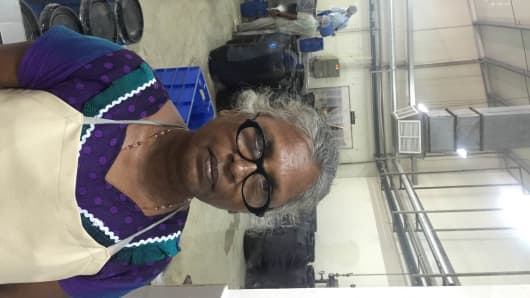
Sri Jegarajah | CNBC
Rasanayagam Sarojinidevi, 64, lost both her sons during the war and is
still traumatized, but says she has found a new purpose working at a
food processing factory owned by Cargills Ceylon.
A devout Hindu, Ponniah has nothing but praise for Cargills. He calls
them "second only to God," a sentiment echoed by 64-year-old Rasanayagam
Sarojinidevi, who works in the staff canteen.
"For me to work here is a huge blessing from God. God has shown me this place, given me this job, only He has done this for me. I am finally peaceful here."
Cargills deputy chairman Ranjit Page says the battle for hearts and minds was a tough one.
"Winning them over, and for them to believe in a corporate from another part of the country is a challenge," Page recalls.
But problems persist and are limiting this region and its people from realizing their full potential. Debt levels have soared. Many cannot pay back what they owe, and that's led to reported suicides.
Several families we talked to – like Sivanesan Kamalarany and her family, uprooted by the war - are still waiting to be re-housed. They're frustrated by what they see as a lack of progress and it's taken a heavy emotional toll.
Kamalarani and her family fled to India in 1998 after their home was destroyed by artillery shelling. They returned in 2012 and built a temporary home by themselves but are still looking for a permanent place to live
Rajeshkumar Vijayarany tells a similar story.
"We are living with hope now that they will give us a house…living another day as a refugee doesn't help, and this is our land."
"For me to work here is a huge blessing from God. God has shown me this place, given me this job, only He has done this for me. I am finally peaceful here."
Cargills deputy chairman Ranjit Page says the battle for hearts and minds was a tough one.
"Winning them over, and for them to believe in a corporate from another part of the country is a challenge," Page recalls.
But problems persist and are limiting this region and its people from realizing their full potential. Debt levels have soared. Many cannot pay back what they owe, and that's led to reported suicides.
Several families we talked to – like Sivanesan Kamalarany and her family, uprooted by the war - are still waiting to be re-housed. They're frustrated by what they see as a lack of progress and it's taken a heavy emotional toll.
Kamalarani and her family fled to India in 1998 after their home was destroyed by artillery shelling. They returned in 2012 and built a temporary home by themselves but are still looking for a permanent place to live
Rajeshkumar Vijayarany tells a similar story.
"We are living with hope now that they will give us a house…living another day as a refugee doesn't help, and this is our land."
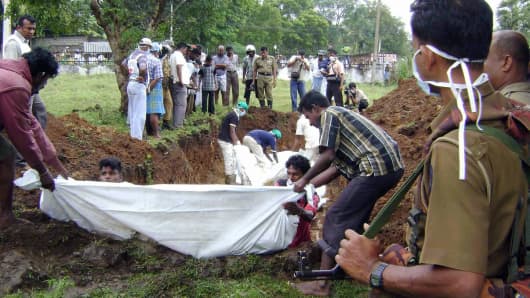
STR | | AFP | Getty Images
Workers bury the bodies of 41 suspected Tamil Tiger fighters recovered
by the government after fighting in the northern district of Vavuniya in
January 2009.
The military's presence here is undeniable. Much land remains under
military and government control; the army even controls and operates
businesses, from lagoon-side resorts to tours of former battlefields.
Our crew took lunch in the picturesque Thalsevana Holiday Resort – run
openly by the military, as its website proudly states – in a
high-security zone.
Many in the country's capital Colombo argue the military's continued presence is necessary to prevent the Tigers from regrouping. But locals believe it sows distrust.
The previous administration did increase spending on infrastructure. The Yal Devi, a Colombo to Jaffna train service, was reconnected after 25 years. And war-weary Tamils appear to be putting the past behind them. In 2013, voter turnout in provincial election was almost 70 percent, the highest of any Sri Lankan province. The landmines have for the most part been cleared.
It's clear what needs to be done next – pick up the pace of post-conflict reconstruction, rehabilitation and reconciliation. The return of the successful Tamil diaspora would be a game-changer in terms of expertise, access to capital and support. Plus, demilitarization of former conflict areas and the revival of what were once thriving local industries are key.
The cement factory we visited in a high-security zone near the coastal town of Kankesanthurai is a good example. In its post-independence heyday, this cement works was a pioneering northern industrial development.
Now, it's idle, rusting, its parts cannibalized, at a time when it should be producing the material so badly needed for reconstruction. But talks have started to revive the cement factory, possibly with investment from the United Arab Emirates.
Green shoots are appearing but the road to a lasting recovery is proving to be a painfully slow one.
Many in the country's capital Colombo argue the military's continued presence is necessary to prevent the Tigers from regrouping. But locals believe it sows distrust.
The previous administration did increase spending on infrastructure. The Yal Devi, a Colombo to Jaffna train service, was reconnected after 25 years. And war-weary Tamils appear to be putting the past behind them. In 2013, voter turnout in provincial election was almost 70 percent, the highest of any Sri Lankan province. The landmines have for the most part been cleared.
It's clear what needs to be done next – pick up the pace of post-conflict reconstruction, rehabilitation and reconciliation. The return of the successful Tamil diaspora would be a game-changer in terms of expertise, access to capital and support. Plus, demilitarization of former conflict areas and the revival of what were once thriving local industries are key.
The cement factory we visited in a high-security zone near the coastal town of Kankesanthurai is a good example. In its post-independence heyday, this cement works was a pioneering northern industrial development.
Now, it's idle, rusting, its parts cannibalized, at a time when it should be producing the material so badly needed for reconstruction. But talks have started to revive the cement factory, possibly with investment from the United Arab Emirates.
Green shoots are appearing but the road to a lasting recovery is proving to be a painfully slow one.
Of taxation, Inland Revenue and Panama Papers

Immediately the following evening (Tuesday) our good friend Deputy Foreign Minister Dr. De Silva, an expert in the area of fiscal policy was heard to complain, during a debate on the same channel, of the appallingly low rate of registered tax payers as opposed to our income earning population; thus this discussion is too much of a temptation to just leave it there, hence these thoughts accompany my (belated) wishes to you for a peaceful and relatively prosperous Sinhala and Tamil New Year!
Let’s use the backdrop of the now infamous Panama Papers revelations as a starting point. So we are made aware of some twenty odd Sri Lankans (yet unnamed) who are supposed to hold and/or benefiting from foreign holdings, assets or income amounting to trillions of rupees, which by law must be disclosed internally and be subject to taxation, unless of course they are entitled to some exemption such as double taxation regime.
This is in addition to the so many “golden horses” and “foreign castles” etc that were mentioned regularly in the run-up to our people’s victory of 8 January last year and repeated ad nauseam in August which were assured to us as matters of priority that would be pursued, reclaimed and credited to the coffers of the people upon assuming governmental power. With all of this yet to see the light of day even one and half years later, we are now appraised (at last week’s Cabinet briefing) that, inter alia:
See more >>>
Avurudu vacation revelations
Court vacation always permits that little bit of extra time to pen something down and the occasion arose when former Dep. Governor of the Central Bank Dr. Wijewardene, Island Editor Shamindra Ferdinando and I were invited by Sirasa TV last Monday for a dialogue on this general theme.
Court vacation always permits that little bit of extra time to pen something down and the occasion arose when former Dep. Governor of the Central Bank Dr. Wijewardene, Island Editor Shamindra Ferdinando and I were invited by Sirasa TV last Monday for a dialogue on this general theme.

Immediately the following evening (Tuesday) our good friend Deputy Foreign Minister Dr. De Silva, an expert in the area of fiscal policy was heard to complain, during a debate on the same channel, of the appallingly low rate of registered tax payers as opposed to our income earning population; thus this discussion is too much of a temptation to just leave it there, hence these thoughts accompany my (belated) wishes to you for a peaceful and relatively prosperous Sinhala and Tamil New Year!
Let’s use the backdrop of the now infamous Panama Papers revelations as a starting point. So we are made aware of some twenty odd Sri Lankans (yet unnamed) who are supposed to hold and/or benefiting from foreign holdings, assets or income amounting to trillions of rupees, which by law must be disclosed internally and be subject to taxation, unless of course they are entitled to some exemption such as double taxation regime.
This is in addition to the so many “golden horses” and “foreign castles” etc that were mentioned regularly in the run-up to our people’s victory of 8 January last year and repeated ad nauseam in August which were assured to us as matters of priority that would be pursued, reclaimed and credited to the coffers of the people upon assuming governmental power. With all of this yet to see the light of day even one and half years later, we are now appraised (at last week’s Cabinet briefing) that, inter alia:
Chandra Fires Warning At Monetary Board Secretary
Good governance activist and former Chairman of the Ceylon Chamber of Commerce, Chandra Jayaratne has warned the Secretary of the Central Bank’s Monetary Board on possibility of imprisonment for as long as 10 years if a public servant is found guilty for corruption.
In a letter titled ‘The Responsibility of a Board Secretary to Advise
the Chairperson, the Board & Top Management on Legal and Statutory
Compliance and Risk Management’ to the Secretary on April 29, 2016,
Jayaratne said a Board Secretary is expected to play an active role in
risk management and in mitigating risk of institutional and personal
liability of board members and top management, as well as in mitigating
risks of reputation risks.
His letter comes, just weeks after he requested the Monetary Board
Secretary to provide him all information pertaining to the recent
Treasury Bond issuance from the Central Bank, amidst allegations of
another bond scam.
The full text of Jayaratne’s letter is below;
29th April 2016.
The Secretary,
Monetary Board of Sri Lanka,
Central Bank of Sri Lanka,
Janadhipathi Mawatha,
Colombo 1.
Monetary Board of Sri Lanka,
Central Bank of Sri Lanka,
Janadhipathi Mawatha,
Colombo 1.
Dear Sir,
The Responsibility of a Board Secretary to Advise the
Chairperson, the Board & Top Management on Legal and Statutory
Compliance and Risk Management
I am sure you will agree with me, that the Codes of Secretarial Best
Practice places an obligation and an expectation that the Secretary of
the Board will be responsible for advising and guiding the board in its
deliberations and decision making, in regard to legal and statutory
compliance requirements. The Board Secretaries are often expected to
develop and oversee the systems that ensure that the institution
complies with all applicable codes of conduct and ethics, in addition to
its legal and statutory requirements. Further a Board Secretary is
expected to play an active role in risk management and in mitigating
risk of institutional and personal liability of board members and top
management, as well as in mitigating risks of reputation risks.
In recognition of the above accountability, kindly review the under
noted statutory provisions applicable in Sri Lanka, and address the need
for you to brief the Chairman, Board Members and top management of the
consequential compliance commitments and essential risk management
processes accountability of the Board and theTop Management;
CHAPTER 26 of the LEGISLATIVE ENACTMENTS -BRIBERY – Being AN ACT TO
PROVIDE FOR THE PREVENTION AND PUNISHMENT OF BRIBERY AND TO MAKE
CONSEQUENTIAL PROVISIONS RELATING TO THE OPERATION OF OTHER WRITTEN LAW.
(1st March, 1954,) where under *PART V – OFFENCES OTHER THAN BRIBERY-
Includes the section 70 –Corruption- brought in to force by the
enactment [§ 7,20 1994.] which reads as;
Four cops including SI interdicted over Dambulla bar fight

 April 29, 2016
April 29, 2016
Four police officers including a Sub-Inspector (SI) attached to the Dambulla Police Station have been interdicted in connection with an altercation which had occurred at a restaurant.
The Police Spokesman’s Office said that a Sub-Inspector, two Sergeants and a Constable were interdicted based on a complaint regarding their alleged involvement in an incident at a restaurant in Dambulla on Wednesday (27).
It has been reported that the four policemen, who were dressed in civilian attire, had visited the restaurant in question for the purpose of obtaining liquor and got into an argument with the staff.
During the confrontation one of the police officers had pulled out a firearm and proceeded to threaten an individual at the establishment.
A decision was taken to interdict the policemen in question pending an investigation into the incident.

 April 29, 2016
April 29, 2016Four police officers including a Sub-Inspector (SI) attached to the Dambulla Police Station have been interdicted in connection with an altercation which had occurred at a restaurant.
The Police Spokesman’s Office said that a Sub-Inspector, two Sergeants and a Constable were interdicted based on a complaint regarding their alleged involvement in an incident at a restaurant in Dambulla on Wednesday (27).
It has been reported that the four policemen, who were dressed in civilian attire, had visited the restaurant in question for the purpose of obtaining liquor and got into an argument with the staff.
During the confrontation one of the police officers had pulled out a firearm and proceeded to threaten an individual at the establishment.
A decision was taken to interdict the policemen in question pending an investigation into the incident.
Friday prayers cancelled in Aleppo for ‘first time’ amid heavy fighting
Despite carnage, Aleppo has been excluded from fresh 'freeze' in fighting due to start tonight
Syrian civil defence volunteers remove body of man from rubble of destroyed buildings after airstrikes on Wednesday (AFP)
Lizzie Porter-Friday 29 April 2016
Despite carnage, Aleppo has been excluded from fresh 'freeze' in fighting due to start tonight
Syrian civil defence volunteers remove body of man from rubble of destroyed buildings after airstrikes on Wednesday (AFP)
MARDIN, Turkey - Friday
prayers were cancelled in Aleppo for the first time since the war
began, after days of airstrikes that led to scores of deaths and left
mosques in ruins.
The city’s legal council on Friday asked mosque guardians to keep places
of worship shut on the eighth continuous day of fighting in the
northern city.
It recommended that people pray in private homes because of the risks posed by “God’s enemies” to public gatherings.
Friday is normally the most significant day of the week in the Islamic
calendar, when thousands of people attend mosques to listen to imams’
sermons and worship collectively.
Subscribe to:
Posts (Atom)



